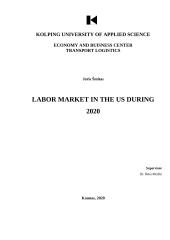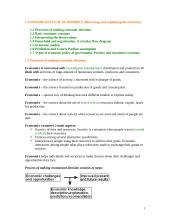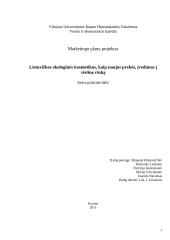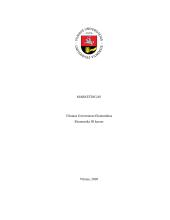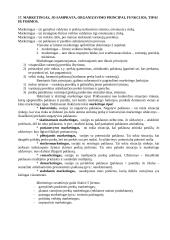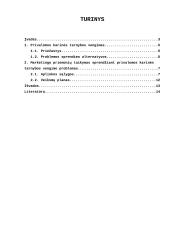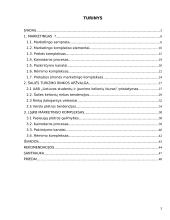Referatai
Women's place in a market economy
VILNIAUS KOLEGIJA EKONOMIKOS FAKULTETAS Užsienio kalbų katedra Dieninių studijų skyriaus I kurso DV05A gr. studentė WOMEN‘S PLACE IN A MARKET ECONOMY Referatas Vertinimas Vilnius 2006 A good woman is hard to find. Either she’s threatening a lawsuit because she was denied a promotion. Or she’s expecting the taxpayers to subsidize her illegitimate children. Or she’s neglecting, even foregoing, children in favour of a career. Or perhaps she wants it all-work, children, love, leisure, and a flexible schedule-making her entirely unreliable. If women seem confused about what they want, society is even more confused about what it wants from women. Social philosophers have long pondered the meaning of work and its place in our moral lives: whether it is ennobling or degrading, whether virtue requires hard work or hard work inculcates virtue, or whether, in an ideal world, there should be more or less work. But when the worker is imagined as a woman, philosophy goes into a new key and both the questions and the answers are of a different tenor. About women, the questions concern whether they ought to work outside the home, whether they are capable of many kinds of work, and whether tending home, family, and community count as work at all. Such philosophical questions have always been at the heart of both labour politics and gender politics. Protective labour legislation in the U.S. finally got off the ground with assistance from women’s reform groups and widely accepted ideas about women. Let’s start with an old chestnut: Is work stultifying, or is it fulfilling and uplifting? [See Alan Wolfe, „The Moral Meanings of Work“, TAP, September-October 1997.] Ask that question assuming the worker is a man and the implied comparison is other kinds of jobs or other ways of organizing work. When the worker is a woman, the implied comparison is with unpaid housework and child care, so the measure of work’s effect on the female worker has a different yardstick: Compared to dusting and diapering? Compared to rearing the next generation of citizens, soldiers, leaders, parents? And the question has a different moral valence in a world where many people, both men and women, have thought that women should not do certain kinds of jobs or engage in paid work at all except in dire necessity. Since marriage and motherhood have been treated as moral obligations of women, if not sacred callings, the question of whether virtue consists in performing disciplined, paid work is shaped by the alternative moral vision of women as guardians of the family and hearth. Probe yet one level deeper and the debate for women is over something even more fundamental: How to reconcile work and womanhood? You might have thought that issue was settled by the feminist movement of the 1960s and 1970s, or by the sheer overwhelming scale of women’s participation in the workforce. But Sharon Hays and Diane Eyre, authors of two recent books on motherhood and work, each make a chilling case that in the dominant scientific culture, biology is still destiny. According to the three gurus of child rearing, Benjamin Spock, T. Berry Braselton, and Penelope Leach, women are supposed to be selfless, nurturing, and caring, not selfish, competitive, and climbing. „In an ideal world“, Leach wrote in 1989, „no woman would ever have a baby unless she really knew that she wanted to spend two or three years being somebody else’s other half“. Moreover, mothering is instinctive and what women really want to do, so all the social pressure on mothers to work is unfortunate. From Braselton in 1983: “We may be ignoring . . . a deep-seated drive in women - a strong feeling that their primary responsibility is to nurture their children and their spouse. It may be unfair to expect a woman to be the fulcrum of her family; but it has always been so, and women feel it instinctively“. Spock, Braselton, and Leach have not been oblivious to the revolution in women’s roles, and they each make stabs at accommodating women who need to work, but less so women who just want to work. The latest edition of Dr. Spock’s Baby and Child Care (now co-authored with Michael Rothenberg) uses the gender-neutral language of parents instead of mothers, but gives away the game in suggesting that a parent in the doldrums „buy a new dress“ or „go to the beauty parlour“ to get some relief. In the revised edition of Infants and Mothers, Braselton acknowledges that he may have inadvertently „added to mothers’ feelings of guilt when they were not able to stay at home throughout the first year“ (note that he doesn’t say „unwilling to stay“), but then he whipsaws them back into guilt: „an understanding of the importance of their role as mothers . . . should help them see mothering as a goal that is as important as anything they can achieve in their professional lives“. Leach, too, pronounces raising a child as „more worthwhile than any other job“. It may seem like the child experts are asking very little of women, just a couple of years at home with each child. But the routine interruption of a woman’s career required by the experts’ advice is so taken for granted that it barely rates a mention. In their assertions of the priority of motherhood over job, they simply assign women different life possibilities than men. Moreover, though the advice may seem slightly archaic in 1997, the books by Spock, Braselton, and Leach are the three top-selling child-rearing manuals, and they create a reservoir of guilt even among today’s women. Just glance through Parents, Working Mother, or Redbook to see how much effort they devote to helping women cope with that guilt. Sharon Hays calls these child-rearing manuals „hesitant moral treatises“, though it’s hard to see from either her or Eyre’s reading of them what’s so hesitant about them. They are, as Hays argues, moral prescriptions for appropriate child rearing and womanly behaviour. They condemn impersonal, competitive market relations-paid child care, for example-and glorify women’s unselfish love, relinquishment of personal goals, and, of course, financial sacrifice. The soul of a woman is a giving soul. If she gives at the office, she’ll have less to give at home. In the eyes of child-rearing experts, a woman who works while her children are young, who cannot turn off her career interests and aspirations, or presumably, her desire for the luxuries her earnings afford, is morally stunted. [Subscribe online – to the American prospect] Women’s proper work One of the ironies of women’s history is that the leading white women social reformers of the Progressive Era sought to keep women in the home (despite their own enjoyment of careers as social workers, nurses, teachers, and political activists). They advocated higher wages for men so families could survive on one income, and they submitted every proposed social reform to the litmus test of whether it would encourage women to work or stay home. They opposed child nurseries and employer-provided maternity insurance for working women-policies dearly sought by current advocates of family-friendly employment-because they didn’t want to encourage women to work. They established state Mothers’ Pensions and later federal Aid to Dependent Children to allow widowed, abandoned, and divorced mothers to be full-time mothers. Black reformers, by contrast, understood the necessity for women to work, and focused their energies on creating the preconditions for women to be wage earners and community leaders. The sacred child Consumerism and the home efficiency movement neatly incorporated middle - and upper-class women into the market world without letting them marketwise their labour, without, in other words, granting them full economic citizenship. But alongside these movements, according to Sharon Hays, another resolution to the problem of women’s place in a market economy was taking shape. What she calls the „ideology of intensive motherhood“ offers society an alternative moral mainspring to the market’s values of self-interest, competition, and acquisitiveness. The ideology of intensive motherhood, as Hays describes it, has three elements. First, a child should have one central caregiver, and it should be the mother, not the father. Second, children and their needs should be at the center of child rearing; mothers should lavish time, energy, and material resources on their children. Last, the child is sacred, so that comparisons of worth between child rearing and any other activity are impossible and morally forbidden. The principles of intensive motherhood would seem to render mothering especially difficult for women who also hold down paying jobs. Yet, Hays found, working women try to live up to the ideal of intensive mothering just as much as stay-at-home mothers; and they are more likely than stay-at-home mothers to view home and children as more rewarding than work. Historian Karl Polanyi, in The Great Transformation, showed how capitalism’s transformation of humans into mobile and fungible elements of labour was a violent wrenching, and how people in eighteenth-century English society created communal mutual aid systems to protect themselves against the brutalities of markets in human labour. Hay argues-quite brilliantly-that the ideology and practice of motherhood are likewise a counterforce to the marketization of all of social life and „the last best defence against . . . the impoverishment of social ties, communal obligations, and unremunerated commitments“. Sure, the ideology serves the interests of capitalists (women are more likely to accept lower wages in the market if they believe they have more important work to do at home); men (they get maid service on a grand scale so they can dedicate themselves to paid work, and fewer women compete with them for jobs); and native-born middle- and upper-class women (norms of appropriate child rearing have been their claim to superiority over the unwashed masses and immigrants). But, Hays insists men and women - even working women - accept and operate according to the values of intensive motherhood because doing so is a way of actively rejecting the supremacy of market logic inside the family. To work or not? It’s conventional wisdom nowadays that most women have to work out of economic necessity, if not as the sole or primary breadwinner, at least to be able to keep up their standard of living in an economy of declining real wages. Yet, there are still a lot of pressures on women (even mothers without husbands) not to work. For one thing, the organization of work is hostile to family life and responsibilities. Work takes time from family life. Inflexible work schedules make it difficult for parents to respond to unscheduled needs of kids like sickness or emotional crises. Overtime, travel, irregular hours, sudden shift changes, and just too much work-all wreak havoc on child care arrangements, not to mention parent-child relationships. The magazines are full of stories of women committed to combining work and motherhood who get shipwrecked on the shoals of work. From the psychologists and paediatricians, the torch of „mother-blame“ is picked up by social scientists, politicians, pundits, and lawyers, who blame working mothers for just about everything that can go wrong with children and society. Riots, delinquency, crime, drug addiction, homelessness, even terrorism have been pinned on single mothers, divorced mothers, welfare mothers, teen mothers. Note that women in any of these categories almost always have to work to support themselves and their kids, so they are guilty from the get-go. They can’t possibly be the dedicated, full-time, by-the-book, meet-your-child’s-every-need mothers the culture reveres. Even as politicians are telling them that they are irresponsible and not entitled to public aid just for taking care of their kids, the scientific establishment tells them they are bad mothers if they go to work. The courts are even more threatening, what with judges occasionally removing kids from a mother on grounds that her work prevents her from taking adequate care of them. The tensions between being a good mother and a good worker affect different social classes differently. A minority of affluent women can participate more intensively in their children’s lives or balance work and family with the aid of domestic help. But the vast majority of working women can’t purchase their way to balancing work, family, and personal fulfilment. Perhaps this explains why business and political elites have so little sympathy for the cross pressures on working parents. Literatūra Žiūrėta internetiniame puslapyje:
Šį darbą sudaro 2246 žodžiai, tikrai rasi tai, ko ieškai!
★ Klientai rekomenduoja
Šį rašto darbą rekomenduoja mūsų klientai. Ką tai reiškia?
Mūsų svetainėje pateikiama dešimtys tūkstančių skirtingų rašto darbų, kuriuos įkėlė daugybė moksleivių ir studentų su skirtingais gabumais. Būtent šis rašto darbas yra patikrintas specialistų ir rekomenduojamas kitų klientų, kurie po atsisiuntimo įvertino šį mokslo darbą teigiamai. Todėl galite būti tikri, kad šis pasirinkimas geriausias!
Norint atsisiųsti šį darbą spausk ☞ Peržiūrėti darbą mygtuką!
- Ekonomikos referatas
- 8 psl., (2246 ž.)
- Word failas 103 KB
- Lygis: Universitetinis
Mūsų mokslo darbų bazėje yra daugybė įvairių mokslo darbų, todėl tikrai atrasi sau tinkamą!
Panašūs darbai
Privalumai
Atsisiuntei rašto darbą ir neradai jame reikalingos informacijos? Pakeisime jį kitu nemokamai.
Pirkdamas daugiau nei vieną darbą, nuo sekančių darbų gausi 25% nuolaidą.
Išsirink norimus rašto darbus ir gauk juos akimirksniu po sėkmingo apmokėjimo!
Atsiliepimai














